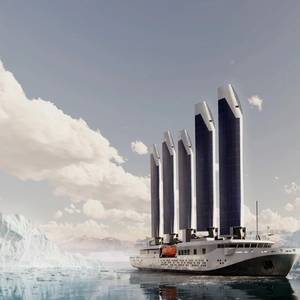
The construction of Captain Arctic, a 69-meter near-zero-emission exploration vessel designed for sustainable cruising in polar waters, has reached a major milestone as its hull was completed by Goltens Dubai, marking the start of final outfitting and integration work.The vessel, owned by French company SELAR and built in collaboration with Chantier Naval de l’Océan Indien (CNOI) and Goltens
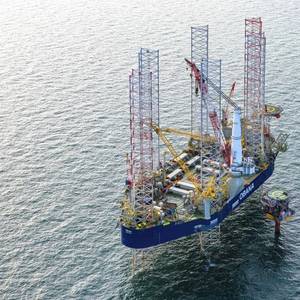
Petrodec’s newly constructed heavy lift jack-up vessel, named Obana, has started decommissioning work in the Southern North Sea for Perenco.Obana is working on the decommissioning of the Galahad platform, after which it will move to the Amethyst field for the removal of the C1D, A2D and B1D jackets, expected to be completed and offloaded in the Netherlands later in 2025.
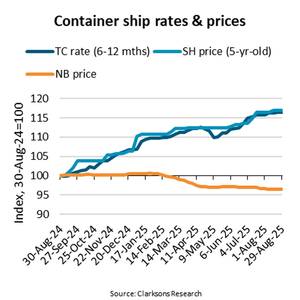
Despite significantly weaker freight rates, the average price for five-year-old container ships has increased 17% year-on-year and 6% since the beginning of 2025,” says Niels Rasmussen, Chief Shipping Analyst at BIMCO.The average per TEU price of a basket of seven five-year-old container ships was $9,761/TEU in late August 2024.
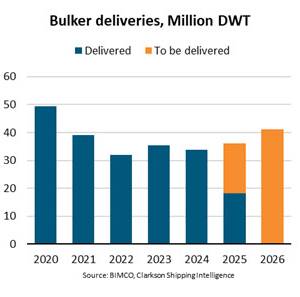
“We forecast that bulker deliveries will gradually increase this year and in 2026, reaching 41.2m Deadweight Tonnes (DWT) and a six-year high. Bulker newbuilding contracting was strong in 2023 and 2024, and several of the ships ordered during this period are expected to be delivered during this and next year,” says Filipe Gouveia, Shipping Analysis Manager at BIMCO.Of the 59.
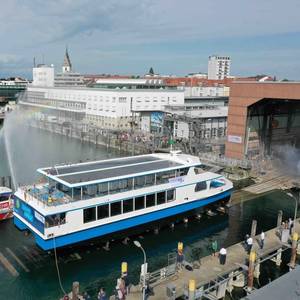
On July 10, 2025, the electric solar passenger ship "Insel Mainau," designed and built by Ampereship GmbH, completed a range test on Lake Constance. During a 19-hour continuous journey, the all-electric catamaran covered exactly 211.3 kilometers on the lake, with a remaining battery capacity of 20 percent. The ship was back in regular operation the very next day.
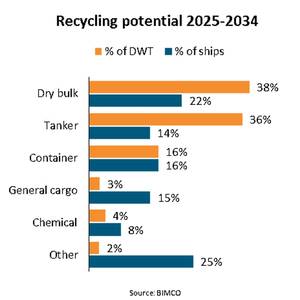
“As the Hong Kong International Convention for the Safe and Environmentally Sound Recycling of Ships (Hong Kong Convention) enters into force we have updated our estimate for the ship recycling potential over the next 10 years. We now estimate the potential to be 16,000 ships, or 700m deadweight tonnes (DWT), from previously 15,000.
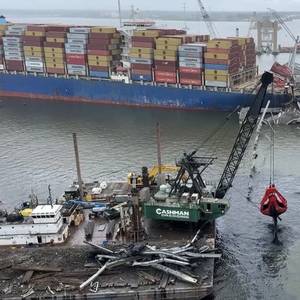
We are at the one-year since the Francis Scott Key (FSK) Bridge collapsed over the Patapsco River’s Fort McHenry Channel in Baltimore, Maryland. Nearly 100 percent of the wreckage and debris removal was conducted by the Jones Act private sector U.S. maritime industry. The FSK collapsed at about 1:28 a.m.
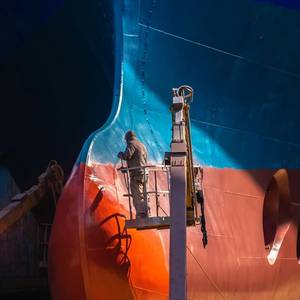
“At the end of 2024, the container ship order book was 8.3m TEU, a new record compared with the previous high of 7.8m TEU in early 2023,” says Niels Rasmussen, Chief Shipping Analyst at BIMCO.As 4.4m TEU were contracted during 2024, the second highest ever, the order book grew despite deliveries hitting a new record high of 2.9m TEU.
Dry bulk contracting falls 70% below average amid low rates.“Over the past three months, dry bulk newbuilding contracting has been 70% below the yearly average. Declining freight rates in recent months, a cloudy outlook and high newbuilding prices contributed to the slowdown, and contracting in 2024 will likely fall short of 2023 levels,” says Filipe Gouveia, Shipping Analyst at BIMCO.

BIMCO has launched a Ship Recycling Alliance to help accelerate safe and environmentally sound recycling of ships. The alliance will co-ordinate the voices of the ship recycling industry and the shipping industry and help facilitate the global implementation of the Hong Kong International Convention for the Safe and Environmentally Sound Recycling of Ships (HKC).
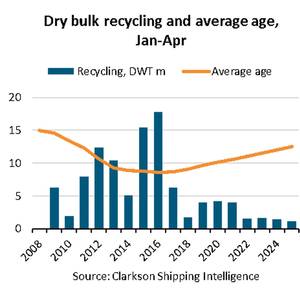
“Between January and April 2025, dry bulk ship recycling has fallen 24% y/y, reaching a 17-year low despite a 35% y/y drop in the Baltic Dry Index (BDI). While weaker freight rates typically encourage the recycling of older and less profitable ships, high uncertainty over the demand outlook could be delaying recycling decisions,” says Filipe Gouveia, Shipping Analysis Manager at BIMCO.
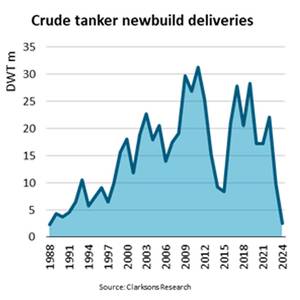
“In 2024, new crude oil tanker deliveries dropped to a 36-year low as only 17 new tankers, with a capacity of 2.5m deadweight tonnes (DWT), joined the fleet. Compared to 2023, the capacity delivered dropped by 74%,” says Niels Rasmussen, Chief Shipping Analyst at BIMCO.During the year, the recycling of crude tankers increased to 1.7m DWT wherefore the fleet ended only 0.